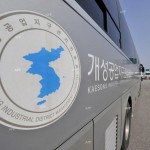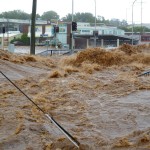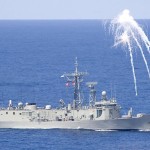- DETERRENCE: UN Sanctions on the Democratic People’s Republic of Korea: prospects and problems
- DPRK: Why do U.S. senior officials visit China in succession?
- ENERGY SECURITY: World has stalled on clean energy
- GOVERNANCE AND CIVIL SOCIETY: Official: China positive on talks with South Korea, U.S. on N. Korea
- CLIMATE CHANGE ADAPTATION: Adaptation or development? exploring the distinctions (or lack thereof) through case studies in Bangladesh and Vietnam
- AUSTRAL PEACE AND SECURITY: Japan stirs Campbell’s US ‘pivot’ soup
 DETERRENCE: UN Sanctions on the Democratic People’s Republic of Korea: prospects and problems, IISS Workshop with UN Panel of Experts, Johannesburg (19 March 2013)
DETERRENCE: UN Sanctions on the Democratic People’s Republic of Korea: prospects and problems, IISS Workshop with UN Panel of Experts, Johannesburg (19 March 2013)
DPRK Sanctions UNSCR 2094 clarifies that the term ‘luxury goods’ includes, but is not limited to, jewellery, yachts, automobiles and racing cars. It was noted that the EU considers malt whisky aged 18 years to be a luxury, by which one might infer that 12-year malt whisky is considered essential.
- No crude exports to DPRK from China in February 2013 data, only small amount of diesel, Zhongguo Haishi Fuwu Wang (China National Shipping Service Net) (22 March 2013) [Chinese Language]
- Penglai Port inspects 11 DPRK ships for radioactivity, Jinan Penglai Entry-Exit Inspection and Quarantine Bureau (18 March 2013) [Chinese Language]
- Trade will expand, China is DPRK’s only destination country of import and export, Dandong Chinese Merchants Overseas Investment Company website (20 February 2013) [Chinese Language]
 DPRK: Why do U.S. senior officials visit China in succession? Liang Jun, People’s Daily Online (27 April 2013)
DPRK: Why do U.S. senior officials visit China in succession? Liang Jun, People’s Daily Online (27 April 2013)
The steady stream of U.S. visitors to China continues. China stepped up customs checks on shipments to and from North Korea. A former United States Forces Korea Commander advocates re-considering Operational Control transfer due to North Korea’s threats. North Korea will harshly sentence Kenneth Bae. He will likely be allowed to leave after that as a goodwill gesture. The formal rapprochement likely starts shortly thereafter.
- China steps up customs checks, but North Korea trade robust, Ben Blanchard, Reuters News Agency (30 April 2013)
- Former USFK commander speaks out against giving S. Korea operational control, Ashley Rowland, Stars and Stripes (29 April 2011)
- North Korea to put American Tour operator Kenneth Bae on trial for ‘trying to overthrow the government’, James Legge, The Independent (UK) (27 April 2013)
 ENERGY SECURITY: World has stalled on clean energy, World Nuclear News (17 April 2013)
ENERGY SECURITY: World has stalled on clean energy, World Nuclear News (17 April 2013)
When it comes to nuclear power, everybody resorts to exceptionalism. Each country believes – at least, argues in public, that it is different. Whatever happens anywhere, “It Will Not Happen Here”. Or at least, “Not again.” The IEA, transformed from a policy coordination think-tank to an advocacy shop for special interests, now recommends a nuclear build rate of at least 16 GW per year to 2020 and 20 GW per year after that, essentially an investment plan of a couple of trillion dollars over the next ten years. For an industry with a record of excellence interspersed by shoddiness, secrecy, roguish and criminal elements and risks of catastrophic failures whose price tab is given to the taxpayers, and whose outputs are weapons of mass destruction.
- Looming clash between Seoul and Washington over nuclear technology, Audrey Yoo, Time (30 April 2013)
- Britain looks to tackle deadly legacy of nuclear power plants, Sylvia Pfeifer, Financial times (29 April 2013)
- Flow of tainted water is latest crisis at Japan nuclear plant, Martin Fackler, The New York Times (29 April 2013)
 GOVERNANCE AND CIVIL SOCIETY: Official: China positive on talks with South Korea, U.S. on N. Korea, UPI (25 April 2013)
GOVERNANCE AND CIVIL SOCIETY: Official: China positive on talks with South Korea, U.S. on N. Korea, UPI (25 April 2013)
As dialogue on the Korean peninsula appears more likely with the ending of US-ROK military exercises, the US and ROK are seeking joint policy coordination with China on DPRK issues. A 24-hour hotline was established between Seoul and Beijing to facilitate this coordination. The closure of the Kaesong complex remains troublesome, with the US and China holding opposite viewpoints on the ROK’s decision to withdraw all workers from the complex.
- China, U.S. at odds over South’s Kaesong stance, Sarah Kim and Choi Hyung-kyu, Joongang Ilbo (30 April 2013)
- The risk of a permanent shutdown at Kaesong, Gil Yun-hyung, Hankyoreh (29 April 2013)
- Hurdles to talks high after North Korea threats, Eric Talmadge, Associated Press (29 April 2013)
 CLIMATE CHANGE ADAPTATION: Adaptation or development? exploring the distinctions (or lack thereof) through case studies in Bangladesh and Vietnam, Partner report series No 8, Stockholm Environment Institute and Regional Climate Change Adaptation Knowledge Platform (2013)
CLIMATE CHANGE ADAPTATION: Adaptation or development? exploring the distinctions (or lack thereof) through case studies in Bangladesh and Vietnam, Partner report series No 8, Stockholm Environment Institute and Regional Climate Change Adaptation Knowledge Platform (2013)
Development is considered a ‘safer’ objective than adaptation, due to the lack of tools to assess success in achieving adaptation through projects. Differentiating between adaptation and development may be an artificial exercise. In theory, there is a difference between adaptation and development. In project implementation, that difference is mostly considered insignificant. In practice, the actions taken to achieve adaptation can hardly be distinguished from those required to achieve sustainable development.
- Successful adaptation to climate change across scales, W. Neil Adger, Nigel W Arnell and Emma L. Tompkins, Global Environmental Change, vol. 15, no. 2 (2005) [subscription required]
- Portfolio screening to support the mainstreaming of adaptation to climate change into development assistance, Richard J.T. Klein et al., working paper 102, Tyndall Centre for Climate Change (2007) [PDF, 539.5 KB]
 AUSTRAL PEACE AND SECURITY: Japan stirs Campbell’s US ‘pivot’ soup, Peter Lee, Asia Times (26 April 2013)
AUSTRAL PEACE AND SECURITY: Japan stirs Campbell’s US ‘pivot’ soup, Peter Lee, Asia Times (26 April 2013)
The less-than-desirable by-product has been the tendency of the pivot’s designated junior partners to tug at the dragon’s whiskers. In the case of Japan, adventurism has gotten out of hand, and the US is responding with anxiety. Japan cutting all sorts of anti-China deals on its own raises the specter of an independent Japanese security policy and, with it, the kind of destabilization that the US pivot to Asia was meant to pre-empt.
- Japan under neonationalist, neoliberal rule: moving toward an abyss? Herbert Bix, Asia-Pacific Journal, Vol 11, Issue 15, No. 2 (15 April 2013)
- Kerry offers missile defense concession, seeks help from China in dealing with North Korea, Michael R. Gordon, Boston Globe (14 April 2013)
- Warship to join US fleet in hot zone: Japan base for frigate, Brendan Nicholson, The Australian (26 April 2013) *Subscription required
The Nautilus Peace and Security Weekly Report presents articles and full length reports each week in six categories: Austral security, nuclear deterrence, energy security, climate change and security, the DPRK, climate change adaptation and governance and civil society. Our team of contributors carefully select items that highlight the links between these themes and the three regions in which our offices are found—North America, Northeast Asia, and the Austral-Asia region.
Subscribe to NAPSNet to receive free weekly email reports
Editor
Contributors
- Deterrence: Peter Hayes
- Governance and Civil Society: Dyana Mardon, Yi Kiho
- Climate Change Adaptation: Saleem Janjua
- DPRK: Roger Cavazos
- Energy Security: Nikhil Desai
- Austral Peace and Security: Richard Tanter

